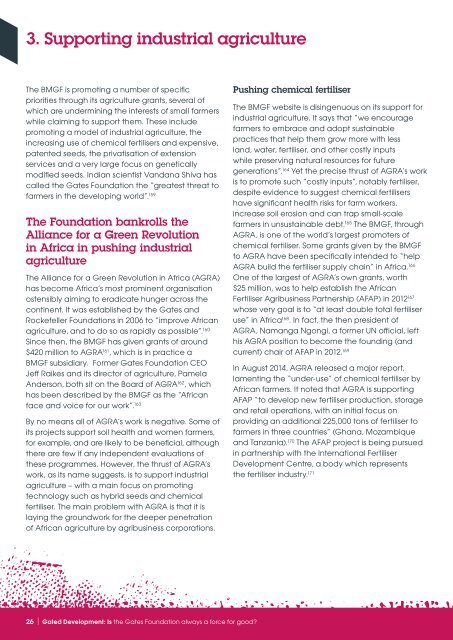Gated Development
gated_development_final_version
gated_development_final_version
Create successful ePaper yourself
Turn your PDF publications into a flip-book with our unique Google optimized e-Paper software.
3. Supporting industrial agriculture<br />
The BMGF is promoting a number of specific<br />
priorities through its agriculture grants, several of<br />
which are undermining the interests of small farmers<br />
while claiming to support them. These include<br />
promoting a model of industrial agriculture, the<br />
increasing use of chemical fertilisers and expensive,<br />
patented seeds, the privatisation of extension<br />
services and a very large focus on genetically<br />
modified seeds. Indian scientist Vandana Shiva has<br />
called the Gates Foundation the “greatest threat to<br />
farmers in the developing world”. 159<br />
The Foundation bankrolls the<br />
Alliance for a Green Revolution<br />
in Africa in pushing industrial<br />
agriculture<br />
The Alliance for a Green Revolution in Africa (AGRA)<br />
has become Africa’s most prominent organisation<br />
ostensibly aiming to eradicate hunger across the<br />
continent. It was established by the Gates and<br />
Rockefeller Foundations in 2006 to “improve African<br />
agriculture, and to do so as rapidly as possible”. 160<br />
Since then, the BMGF has given grants of around<br />
$420 million to AGRA 161 , which is in practice a<br />
BMGF subsidiary. Former Gates Foundation CEO<br />
Jeff Raikes and its director of agriculture, Pamela<br />
Anderson, both sit on the Board of AGRA 162 , which<br />
has been described by the BMGF as the “African<br />
face and voice for our work”. 163<br />
By no means all of AGRA’s work is negative. Some of<br />
its projects support soil health and women farmers,<br />
for example, and are likely to be beneficial, although<br />
there are few if any independent evaluations of<br />
these programmes. However, the thrust of AGRA’s<br />
work, as its name suggests, is to support industrial<br />
agriculture – with a main focus on promoting<br />
technology such as hybrid seeds and chemical<br />
fertiliser. The main problem with AGRA is that it is<br />
laying the groundwork for the deeper penetration<br />
of African agriculture by agribusiness corporations.<br />
Pushing chemical fertiliser<br />
The BMGF website is disingenuous on its support for<br />
industrial agriculture. It says that “we encourage<br />
farmers to embrace and adopt sustainable<br />
practices that help them grow more with less<br />
land, water, fertiliser, and other costly inputs<br />
while preserving natural resources for future<br />
generations”. 164 Yet the precise thrust of AGRA’s work<br />
is to promote such “costly inputs”, notably fertiliser,<br />
despite evidence to suggest chemical fertilisers<br />
have significant health risks for farm workers,<br />
increase soil erosion and can trap small-scale<br />
farmers in unsustainable debt. 165 The BMGF, through<br />
AGRA, is one of the world’s largest promoters of<br />
chemical fertiliser. Some grants given by the BMGF<br />
to AGRA have been specifically intended to “help<br />
AGRA build the fertiliser supply chain” in Africa. 166<br />
One of the largest of AGRA’s own grants, worth<br />
$25 million, was to help establish the African<br />
Fertiliser Agribusiness Partnership (AFAP) in 2012 167<br />
whose very goal is to “at least double total fertiliser<br />
use” in Africa 168 . In fact, the then president of<br />
AGRA, Namanga Ngongi, a former UN official, left<br />
his AGRA position to become the founding (and<br />
current) chair of AFAP in 2012. 169<br />
In August 2014, AGRA released a major report,<br />
lamenting the “under-use” of chemical fertiliser by<br />
African farmers. It noted that AGRA is supporting<br />
AFAP “to develop new fertiliser production, storage<br />
and retail operations, with an initial focus on<br />
providing an additional 225,000 tons of fertiliser to<br />
farmers in three countries” (Ghana, Mozambique<br />
and Tanzania). 170 The AFAP project is being pursued<br />
in partnership with the International Fertiliser<br />
<strong>Development</strong> Centre, a body which represents<br />
the fertiliser industry. 171<br />
26 I <strong>Gated</strong> <strong>Development</strong>: Is the Gates Foundation always a force for good?


